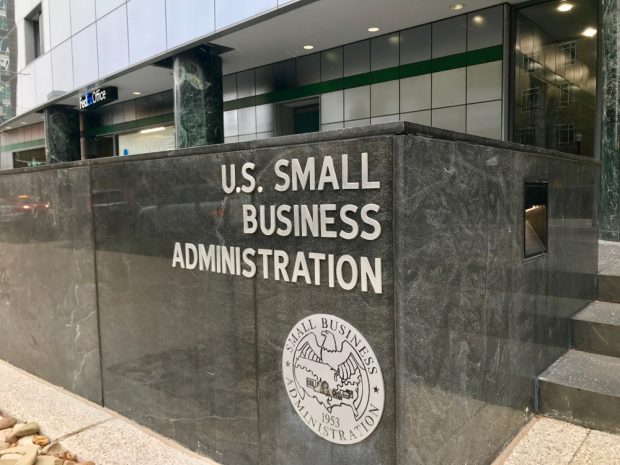 Small Business Administration headquarters building entrance (Image: Shutterstock).
Small Business Administration headquarters building entrance (Image: Shutterstock). The House passed legislation this week that would extend the Paycheck Protection Program to the end of May in an effort to help unblock the logjam at the Small Business Administration just weeks before the loan program is scheduled to end.
Credit union trade groups and others have said that the SBA has been slow in processing PPP loans—raising concerns that some loans may not be approved by the time the program's authorization expires at the end of this month.
Recommended For You
"By providing small businesses with two more months to apply and giving the SBA an additional month to process applications, we will help ensure critical support isn't cut off," House Small Business Chairwoman Nydia Velázquez, (D-N.Y.) said, following passage of the legislation.
The bill, HR 1799, passed 415-3. A companion bill has been introduced in the Senate, which has not yet considered it.
The legislation comes, as the SBA's Inspector General reports that the in the first batch of PPP loans last year, the SBA made more than one PPP loan disbursement to 4,260 borrowers with the same tax identification number and business name. The loans total $692 million for PPP loans approved between April 3 and Aug. 9.
"Management plans to review and resolve duplicate loans by recovering improper payments and preventing loan forgiveness on ineligible loans," the IG said in the report.
The IG noted that attempting to recoup loan funds once they have been disbursed is far less efficient than trying to recapture them once the loans are made.
"It is more prudent and effective to safeguard funds up front, when capital is still in the lenders' control, than attempting to recover funds after disbursement," the IG said.
"SBA must balance maintaining sufficient controls while also providing needed funds to eligible borrowers during pandemic recovery," the IG continued.
However, those controls are causing delays in loan processing, sponsors of the PPP extension legislation contend.
"Currently, PPP loans are facing lengthy delays as error codes force multiple back and forth conversations between small businesses, lenders, and the SBA," House Small Business Committee ranking Republican Blaine Luetkemeyer of Missouri said, following House passage of the bill. "And these crosschecks are creating uncertainty as to how the loans will proceed."
Congressional committees, the Government Accountability Office and the IG have issued a series of reports criticizing management of the PPP program by the SBA and the Treasury Department. Supporters of the program have noted that the PPP was rolled out quickly to allow the agencies to start lending as soon as possible.
The SBA reported that as of March 14, 824 credit unions with less than $10 billion in assets have made 83,608 PPP loans this year, totaling more than $3.6 billion. Eight credit unions with more than $10 billion in assets have made 9,131 loans, totaling about $304 million.
© 2025 ALM Global, LLC, All Rights Reserved. Request academic re-use from www.copyright.com. All other uses, submit a request to asset-and-logo-licensing@alm.com. For more information visit Asset & Logo Licensing.






